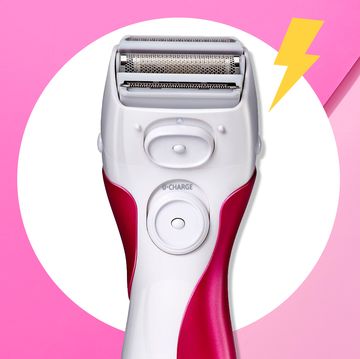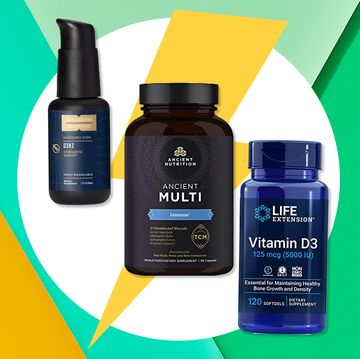There are so many supplements on the market, chances are you take one (or more) every day. One of the most popular: fish oil. In fact, Americans spend about $1.3 billion a year on this variety, reports the Nutrition Business Journal. But some of the supporting data is iffy at best. So should you really be dropping your hard-earned dough on them? Here’s what you need to know.
The Benefits of Fish and Fish Oil Supplements
Fish is prized for its lean protein and omega-3 fatty acids, which have been shown to fight inflammation, promote heart health and brain function, and manage depression. The American Heart Association recommends eating fish twice a week, but that's not so easy for everyone. Maybe you’re not a fan of the taste, or you stick to a strict vegan diet, or you don’t have the funds to tack pricey fresh fish onto your grocery bill.
That’s when fish oil supplements can be beneficial. The capsules were made to deliver omega-3s that rival those found in fatty fish like salmon, anchovies, and tuna. And they do it at a lower price and in a form that’s easier for fish haters to stomach. Some studies show fish oil supplements can effectively treat heart conditions, lower triglycerides, and improve blood vessel functioning among people with diabetes.
RELATED: 5 Foods That Contain Omega-3s That Aren't Fish
They also help you avoid the heightened mercury levels that come with eating too much fish, says Philip Caravella, M.D., author of Weight No Longer: The Prescription for Amazing Fitness and Living. In addition to limiting your fish intake to a couple of servings a week, the Food and Drug Administration recommends avoiding high-mercury options like swordfish, shark, king mackerel, and tilefish—especially if you’re pregnant or nursing, since mercury could mess with the baby’s nervous system.
Fish oil supplements are not only safe but recommended for pregnant women. “If anybody should be taking them, it would be pregnant women,” says Caravella. That’s because the supplements have been shown to aid the baby’s brain and retina development and also lower the risk of having a low birth weight baby, he says.
The Downside
Several other studies show fish oil has no effect whatsoever. Researchers from a JAMA Internal Medicine study reviewed 24 studies that were published between 2005 and 2012 and found that only two of them had a plus side to taking the supplements.
“The research is conflicting,” says Nicole Anderson Goodrich, R.D.N., founder of Anderson's Nutrition in Phoenix. That’s likely because this is all still relatively new. “We look at areas like Japan that have low instances of heart disease and we say, ‘Oh, they eat a lot of fish,’” she says. Then, researchers try to pull out the beneficial omega-3 fatty acids and put them into fish oil supplements. The problem, explains Goodrich, is the Japanese people ate fish—not supplements—and apparently you can’t just interchange them and expect the same results.
“When we look at communities that actually consume food, we’re seeing the health benefits,” she says. “But when we’re breaking it down in the lab through supplementation, we’re not seeing those types of benefits coming out of it.”
RELATED: The Final Verdict on Eating Fish While You're Pregnant
So, Should You Take Them?
To make things more confusing, experts have mixed feelings on fish oil supplements; some think they’re overrated, but others recommend them. The one thing they do agree on, though: It’s best to get your omega-3s straight from the source if you can.
“It’s always better to get your nutrients from food because food is loaded with so much more than just nutrients—there are all sorts of biochemicals, macronutrients, and micronutrients,” says Kathleen Zelman, R.D., WebMD’s director of nutrition. “The best way to satisfy your omega-3 fatty acids is to eat fatty fish.”
If you’re vegan (or you just don’t like fish), you can opt for other foods that are rich in omega-3s, like walnuts, canola oil, and flaxseeds. Not into any of the above? Then fish oil supplements are a solid plan B. They’re not going to hurt you; they’re just not necessary if you’re getting your omega-3s elsewhere.
RELATED: How to Make Canned Fish Fancy
Now, About Those Fishy Side Effects...
If you decide to take them or your doctor recommends them to you, you’ll quickly realize you’re going to have to deal with fishy burps—or worse. “Somebody who has a really high dose will have an odor to them,” says Goodrich. She adds that many brands advertise “burp-less” formulas, but they generally don’t live up to those promises.
Your best bet is to stick with supplements that have a USP seal of approval on the bottle, says Zelman. And then experiment a little to see what works best for you. “Some people find that if they pop them in the freezer or if they take them at night or with food, they tolerate them better,” says Zelman.
The bottom line: Fish trumps fish oil supplements. But if you don’t eat enough of the stuff, supplements are an easy way to nab omega-3 benefits. “If you can’t get them from your diet, then supplements are the next best thing,” says Zelman.













